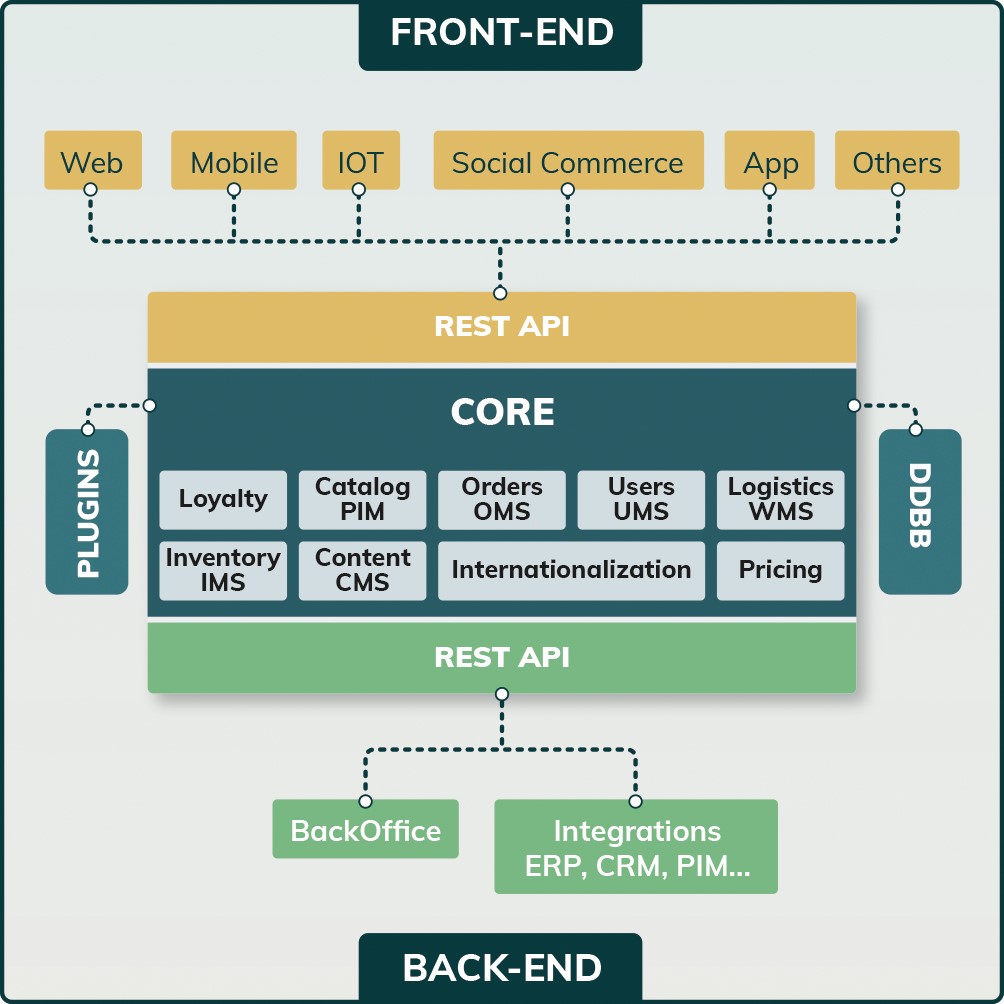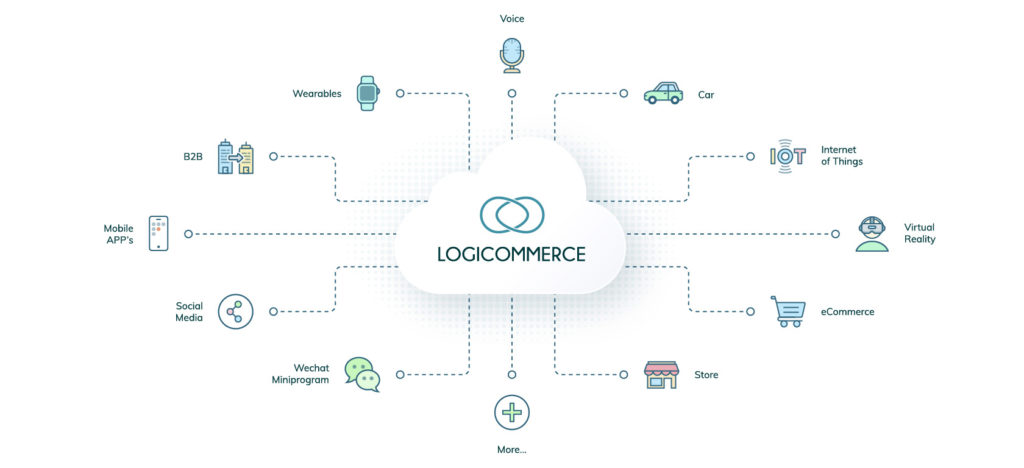LogiCommerce is trusted by global enterprise brands and wholesalers, across industries
Headless eCommerce is a game changer when it comes to responding to consumer needs and adapting quickly to changing market trends.
Shopping habits have changed dramatically since the arrival of eCommerce. Headless eCommerce stands out as one of the most significant developments within this sector, offering a wide range of options to both businesses and customers. Headless architecture breaks with the traditional approach, allowing for greater flexibility and scalability in the customer shopping experience.
As a result, this has enabled much faster growth for enterprises internationally and has taken the customer experience to the next level, with faster load times, a higher fulfillment rate and better management of data access.
In this article, we will explore what a Headless architecture is, what its benefits are over a monolithic platform, and why Headless is the future of eCommerce.
Contents
Headless eCommerce is the term used to define a new way of understanding eCommerce. It is based on an architecture that separates the Front-end (visual part of the website) from the Back-end (web development part) in order to work with fewer limitations and more flexibility.
Both parts (Front-end and Back-end) are connected through an Application Programming Interface (API), which allows information to be exchanged between the two of them. For example, imagine that a user clicks on a product displayed on the Front-end, meaning a brand's website in order to access more information; description, images, customer reviews, price, size and color, among others. At that point, the Front-end requests all this information to the Back-end, and through APIs, this information can be requested and delivered to the user instantly.
That way, the Front-end and the Back-end work independently, which means that changes can be made in the Front-end without affecting the Back-end, and vice versa. In addition, the customer's shopping experience is decoupled from the management of an eCommerce platform, allowing for greater personalization across all sales channels.
It is the showcase of an eCommerce, that is, the visible layer with which users interact. It contains all the visible elements in an online store, such as the home page, the product catalog, the menu, images, icons and the shopping cart, among others.
In short, it is the place where a user performs the navigation, purchase and payment process, among other things.
It is the logic of the system, that is, everything that makes an eCommerce work, and therefore is not visible to the user. Most of the functionalities of an eCommerce reside in it, and it is the part that is in charge of carrying out all the processes according to the agreed business rules.
The processing of this information is then used by one or more Front-ends.
It is the interface that is responsible for exchanging data and information between all Front-ends and the Back-end. So, all the information stored in the Database of an eCommerce, is sent to the Front-end through an API.

Headless eCommerce delivers exceptional shopping experiences by providing greater freedom and flexibility to personalize the user experience. This allows brands to tailor a new approach to their customers, anticipating their needs, adapting to new trends and using cutting-edge technologies at a reduced maintenance cost. Headless architecture provides an ideal platform that is relatively easy to upgrade without disrupting Core performance, which removes a major barrier to user satisfaction.
Headless eCommerce makes it easier than ever for companies to create unique and personalized shopping experiences that can evolve based on customer demands.
Headless eCommerce is an approach that offers a clear advantage when it comes to scalability. With a Headless eCommerce platform, the Front-End and Back-end components are kept separate, allowing for individual scalability even during high traffic peaks. This is a great improvement over traditional architectures, which require both components to scale together to deliver adequate performance.
As a result, Headless eCommerce can be a great scalability option for companies looking to future-proof their operations.
Headless eCommerce enables seamless integrations as a result of its Core Framework and APIs. This means that companies can quickly and easily connect platforms, tools and services without having to invest large amounts of time in development and configuration. Companies can now connect marketing tools, ERP, CRM, PIM, payment systems and many more with greater ease and flexibility.
Headless architecture facilitates a clean data exchange between different software that was previously difficult for even the most experienced IT specialists. This allows companies to take advantage of all the features offered by these powerful tools without losing sight of their customers' shopping experience.
Headless eCommerce is revolutionizing the way businesses engage with customers by creating an omnichannel strategy. Headless architecture enables greater agility in connecting with sales channels across multiple devices, resulting in fully integrated and unified shopping experiences.
Companies can customize multiple Front-Ends and link them to a Core, providing enhanced scalability and seamless integrations with other platforms. This increased flexibility results in richer customer experiences and higher conversion rates, ensuring that companies stay ahead of the curve.
Headless eCommerce presents a great opportunity to expand your business to new markets and reach a wider audience. This exciting option allows you to maintain an engaging customer experience while simplifying, streamlining and reducing the costs of internationalizing a business.
Headless eCommerce offers flexibility in eliminating borders and helps you cover all the elements to consider such as language, currencies, consumer preferences and habits, preferred payment methods, pricing, transportation, storage, taxes, and so on that differ between markets.
With Headless eCommerce you can bridge any gaps between global markets and create a unified brand experience for customers around the world.
In monolithic eCommerce, developers face multiple limitations when it comes to making changes, modifications and updates to the Front-end design, since in a monolithic architecture, the Front-end and Back-end work together, which means that they depend on each other, so making any modifications involves a greater risk and amount of time.
On the other hand, Headless eCommerce is the go-to solution for developers who want to make changes to their Front-end design quickly and with minimal risk. Headless eCommerce separates the presentation layer from the business logic, allowing them to focus only on what needs to be changed in the Front-End without having to go back and forth between the core code or database data. This makes Front-End design modification an incredibly simple process, requiring minimal time and risk.
Headless eCommerce solutions have proven to be a reliable choice for developers who want to deploy their updates quickly and efficiently.
Monolithic eCommerce platforms offer very limited opportunities to customize the Front-End, as all aspects of the user experience are predefined by templates that have a unified Front-End and Core. This lack of flexibility can lead to frustrating discussions between marketing and design teams and developers, who have to evaluate whether or not the requested changes can be implemented, as well as whether or not they will negatively affect the proper performance of the platform.
It is true that monolithic systems offer certain advantages in terms of development speed, but their rigid nature makes it difficult for companies to stand out on the Internet while delivering a personalized user experience to customers.
In contrast, a Headless eCommerce platform is capable of revolutionizing the customer experience, allowing businesses to create a personalized website with fewer design constraints. This is achieved by decoupling the Front-end design from the Back-end architecture to take full advantage of each channel and device's storefront. This new freedom allows companies to precisely tailor their corporate identity and create a unique experience for each user without compromising quality or load time.
Headless eCommerce makes it easier than ever to create exactly the look and feel you want for your customers, resulting in greater trust and loyalty between a company and its customers.
Working with monolithic eCommerce platforms can be difficult, due to the lack of flexibility they have. For example, making a change to the Front-end usually means having to make a modification to the Core part as well, and this inevitably increases the workload.
In addition, integrating third-party solutions into monolithic architectures can be extremely complicated due to their inherent rigidity. In short, monolithic eCommerce platforms do not offer companies much room for flexibility and customization, which can cost them a lot of time and money.
Headless eCommerce platforms are becoming increasingly popular because of their flexibility and ability to make small or large changes at any time to the Front-end content without relying on the Core. With Headless, marketing teams now have more control and can easily integrate with their favorite third-party solutions to deliver a unique and personalized customer experience.
This new freedom allows companies to create solutions tailored to their individual needs better than ever before. All of these benefits are available thanks to the great flexibility and adaptability of Headless, which makes it easy to deploy on almost any existing infrastructure.

LogiCommerce offers the best of Headless Commerce and traditional eCommerce in a single platform. It provides full Front-end control for a unique customer experience with robust and reliable technology in every channel of any business, from highly customized PHP, react.js, angular or any other new technology to integrate the most complex designs with high precision.
LogiCommerce is the Headless SaaS eCommerce platform for growing businesses and large organizations that delivers cutting-edge technology through a fully unified B2B & B2C platform.
With over 200 native features, a highly intuitive BackOffice, real-time integrations with third-party solutions, a globally self-scalable infrastructure, regular updates and 24/7 support, among many other things, LogiCommerce becomes one of the most affordable platforms on the market.
Thanks to its transparent pricing policy, with no hidden costs or transaction fees, you can reduce technical debt and keep your TCO to a minimum. World-renowned brands such as VW, GAP, Audi, eseOese, Munich, Nestlé and IMC Toys use LogiCommerce.
Headless eCommerce is an ideal solution for brands that are working to grow with cost-effective and more personalized strategies.
With this new approach, your business achieves greater flexibility, adaptability, competitiveness and personalization that will undoubtedly allow you to improve the customer experience and drastically reduce the workload.
The user gets the same quality of eCommerce from any device, and companies get to maximize the potential of their online stores.
The future of eCommerce is here, and it's Headless. A new era begins with LogiCommerce. Tell us about your project!
